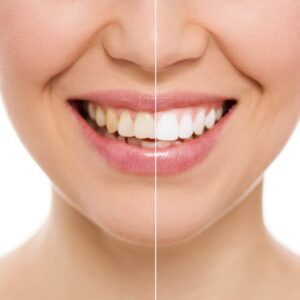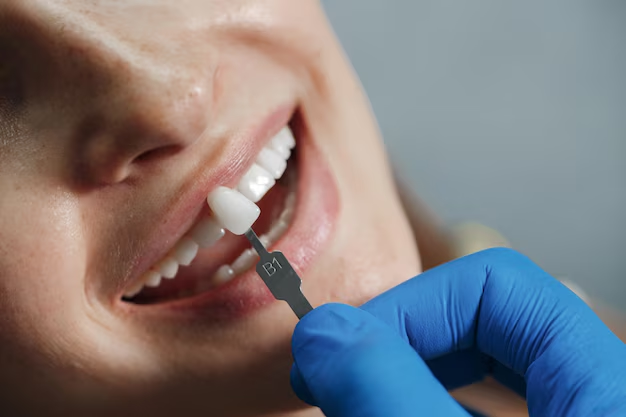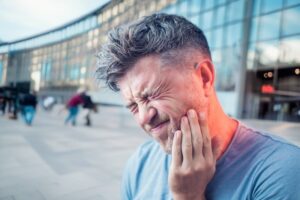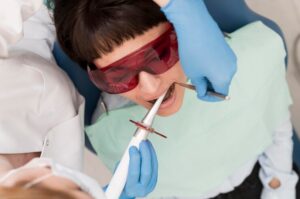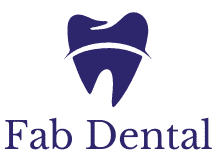
Maintaining good oral hygiene is essential for keeping your healthy teeth and your smile bright. However, certain habits can negatively impact your dental health, even if you brush and floss regularly. In this blog, we’ll explore the bad habits you should avoid to protect your teeth and maintain optimal oral health.
1. Skipping Regular Brushing and Flossing
One of the most common and damaging habits is neglecting to brush and floss your teeth regularly. Failing to clean your teeth at least twice a day allows plaque to build up, which can lead to tooth decay, cavities, and gum disease.
Tip: Make brushing and flossing a part of your daily routine to remove plaque, prevent cavities, and keep your gums healthy.
“Healthy teeth begin with healthy habits. By avoiding harmful habits like neglecting brushing or using teeth as tools, you can protect your smile for years to come.”
— Dr. Alag, DDS, FAGD, Fab Dental
2. Using Your Teeth as Tools
Using your teeth to open packages, tear off tags, or crack nuts may seem convenient, but it can cause chips, cracks, or fractures in your teeth. This habit puts unnecessary stress on your teeth, potentially leading to painful injuries or long-term damage.
Tip: Always use scissors or appropriate tools for tasks like opening packages, and avoid using your teeth for anything other than chewing food.

3. Eating Sugary and Acidic Foods Frequently
Consuming sugary or acidic foods and drinks too often can erode your tooth enamel and increase your risk of cavities. Sugar feeds the harmful bacteria in your mouth, leading to plaque buildup and tooth decay, while acidic foods can wear down enamel over time.
Tip: Limit sugary snacks and drinks, especially between meals. Drink water after consuming acidic foods or beverages to help rinse away acids and sugar.
4. Brushing Too Hard
While brushing your teeth is essential for removing plaque and food particles, brushing too hard can damage your gums and tooth enamel. This can lead to gum recession, tooth sensitivity, and weakened enamel over time.
Tip: Use a soft-bristled toothbrush and brush gently with circular motions. Avoid pressing too hard on your teeth while brushing.
5. Grinding Your Teeth (Bruxism)
Teeth grinding, or bruxism, often occurs during sleep due to stress, anxiety, or misaligned teeth. Over time, grinding can cause worn-down teeth, jaw pain, headaches, and even tooth fractures.
Tip: If you grind your teeth at night, consider using a mouthguard to protect your teeth. Consult with your dentist to address any underlying causes of bruxism.
6. Smoking or Chewing Tobacco
Tobacco use is harmful to your overall health, and it can also lead to serious dental problems, such as gum disease, tooth loss, and oral cancer. Smoking and chewing tobacco can stain your teeth, cause bad breath, and decrease your mouth’s ability to heal after dental procedures.
Tip: Quitting smoking or using tobacco products is one of the best things you can do for your oral health and overall well-being.
7. Drinking Too Much Coffee, Tea, or Soda
Drinks like coffee, tea, and soda can stain your teeth and contribute to enamel erosion due to their acidic content. Frequent consumption of these drinks, especially without proper oral hygiene, can lead to discoloration and cavities.
Tip: Limit consumption of these beverages and rinse your mouth with water afterward. Consider using a straw to reduce contact with your teeth.
8. Neglecting Regular Dental Checkups
Skipping regular dental checkups is a habit that can have long-term consequences for your oral health. Regular visits to the dentist allow for early detection of dental issues such as cavities, gum disease, and oral cancer, which can be treated before they become serious.
Tip: Schedule regular dental visits every six months for cleanings, exams, and early detection of potential problems.
9. Chewing on Hard Objects
Chewing on hard objects like pens, ice, or hard candies can cause your teeth to crack or break. This habit can lead to serious dental issues, including the need for fillings, crowns, or even tooth extractions.
Tip: Avoid chewing on hard objects, and stick to chewing sugar-free gum if you need to relieve stress or occupy your mouth.
10. Ignoring Dry Mouth
Dry mouth, or xerostomia, occurs when your mouth doesn’t produce enough saliva. Saliva is essential for washing away food particles, neutralizing acids, and preventing tooth decay. If left untreated, dry mouth can lead to tooth decay and gum disease.
Tip: Stay hydrated, use saliva-stimulating products, and address the underlying cause of dry mouth with your dentist or doctor.
Frequently Asked Questions
What happens if I skip brushing and flossing regularly?
Skipping regular brushing and flossing allows plaque to build up, which can lead to tooth decay, cavities, and gum disease. It’s crucial to brush at least twice a day and floss once to maintain good oral health.
Why should I avoid using my teeth as tools?
Using your teeth to open packages or crack nuts can cause chips, cracks, or fractures, putting unnecessary stress on them. This can lead to painful injuries or long-term damage.
Can sugary foods really harm my teeth?
Yes, sugary foods feed harmful bacteria in your mouth, leading to plaque buildup and cavities. Acidic foods can also erode enamel, further weakening your teeth.
What are the dangers of grinding my teeth?
Grinding your teeth, especially at night, can cause worn-down teeth, jaw pain, headaches, and fractures. It’s important to manage stress and consider using a mouthguard to protect your teeth.
Why is it important to visit the dentist regularly?
Regular dental checkups allow your dentist to detect issues like cavities, gum disease, and oral cancer early. Catching problems early means more effective treatment and less invasive procedures.
Conclusion
Good oral hygiene is essential for maintaining a healthy smile, but avoiding bad habits is just as important. By steering clear of these harmful habits, you can protect your teeth from decay, erosion, and damage, and ensure long-term dental health. Remember, regular dental checkups and healthy lifestyle choices play a key role in keeping your teeth in excellent condition. If you have any questions or need help breaking bad dental habits, don’t hesitate to consult with your dentist!

